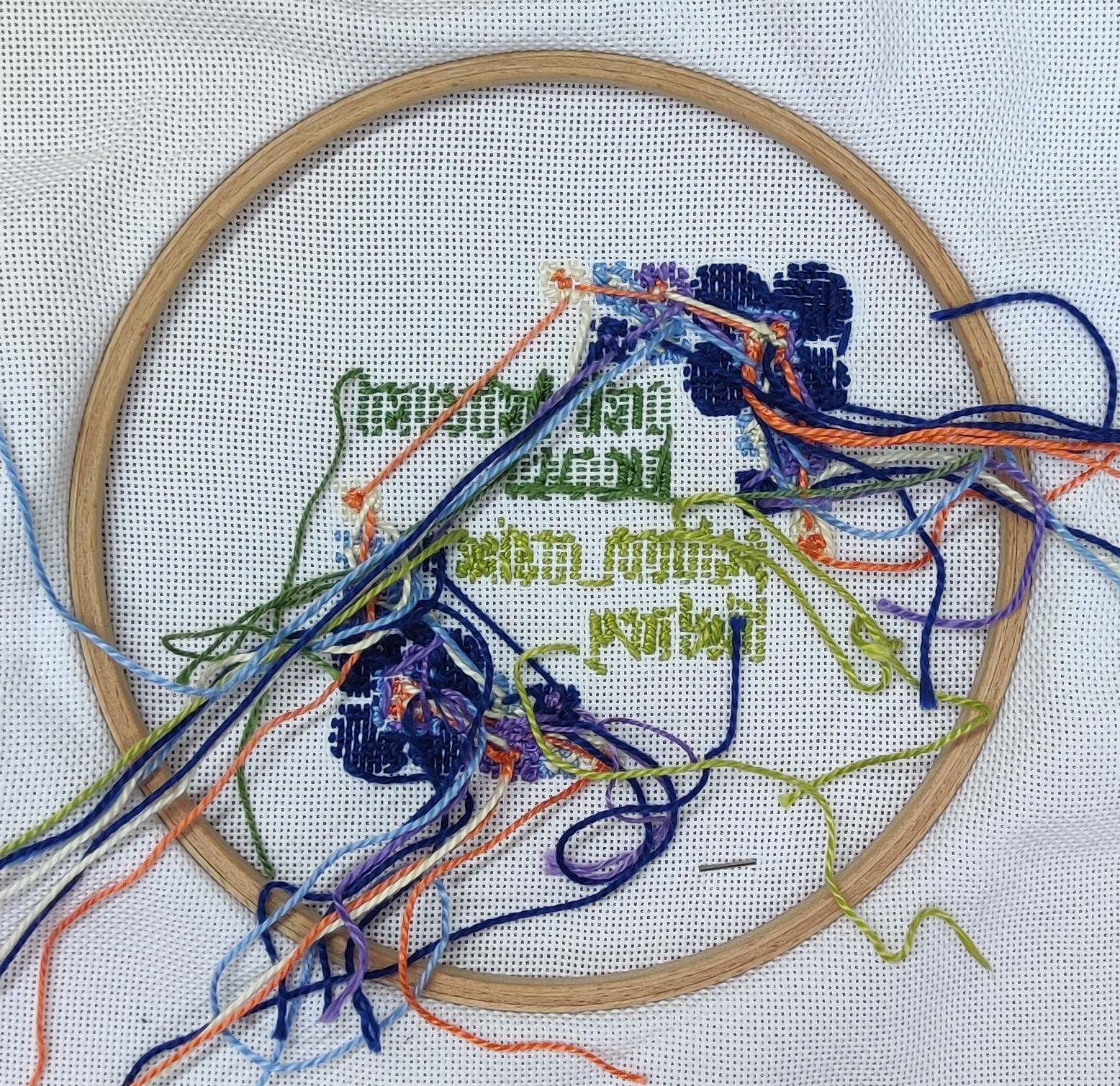Stitching Together (in) Anthropology Class
On the Use of Craft Practices in Higher Education Humanities
DOI:
https://doi.org/10.7577/formakademisk.5386Emneord (Nøkkelord):
making, anthropology, learning, epistemology, uncertaintySammendrag
As an anthropologist teaching at a German-speaking Cultural Anthropology and European Ethnology Department (pertaining to a Humanities Faculty), it always struck me how much we know about the role embodiment plays in and for culture and how little we make use of this in teaching. For this reason, I decided to expand established Higher Education pedagogy by putting craft (as a) practice at the centre of my newly developed course entitled DIY in Times of Crisis and Beyond. As a result, my students and I developed our thinking through and while practising embroidery in class, weaving in the mandatory readings and narrations of (pandemic) crafting experiences along the way. Borrowing from the low-threshold approach to stitching in community-based creativity projects, our shared and mostly novice stitching facilitated the articulation of thoughts-in-progress, thus creating a space in which dominant views regarding social (craft) norms, quantifiable productivity as well as academic logocentrism could be temporarily suspended, giving way to embodied wisdom.
Referanser
Ahmed, S. (2017). Living a Feminist Life. Duke University Press. https://doi.org/10.1515/9780822373377
Arantes, L.M. (2020). Learning to Dwell with Micro-Organisms. Anthropology in Action, 27(2), 40–44. https:// doi.org/10.3167/aia.2020.270206
Arantes, L.M. (2020). Unraveling Knitting: Form Creation, Relationality, and the Temporality of Materials. Journal of American Folklore, 133(528), 193–204. https://doi.org/10.5406/jamerfolk.133.528.0193
Arantes, L.M. (2021): Desiring the absence of knowledge: On knitting ethnographies and navigating diaries. In F. Martínez, L. Di Puppo & M.D. Frederiksen (Eds.), Peripheral methodologies: Unlearning, not-knowing and ethnographic limits (pp. 63–80). Routledge. https://doi.org/10.4324/9781003103646-7
Arantes, L.M. (2022): Das pandemische Brotbacken: Liminalität und Communitas in Corona-Zeiten. In J. Beuerbach et al. (Eds.), Covid-19: Sinn in der Krise: Kulturwissenschaftliche Analysen der Corona-Pandemie (pp. 267–281). DeGruyter. https://doi.org/10.1515/9783110734942-015
Buchczyk, M. (2020). Making Certainty and Dwelling through Craft. Journal of American Folklore, 133(528), 178–192. https://doi.org/ 10.5406/jamerfolk.133.528.0178
Crawford, M.B. (2010). The Case for Working with Your Hands: Or Why Office Work is Bad for Us and Fixing Things Feels Good. Viking.
Cvetkovich, A. (2012). Depression: A Public Feeling. Duke University Press. https://doi.org/10.1215/9780822391852
Devereux, G. (1967). From Anxiety to Method in the Behavioral Sciences. Mouton & Co. https://doi.org/10.1515/9783111667317
Federici, S. (2012). Revolution at point zero: Housework, reproduction, and feminist struggle. PM Press.
Gatt, C. & Allen, J. (2019, January 30). Sketches for Regenerative Scholarship. Correspondences, Fieldsights. https://culanth.org/fieldsights/sketches-for-regenerative-scholarship.
Graham, H., Hill, K., Holland, T. & Pool, S. (2015). When the workshop is working. Qualitative Research Journal, 15(4), 404–415. https://doi.org/10.1108/QRJ-06-2015-0043
Hackney, F. & Setterington, L. (2022). Crafting with a purpose: How the ‘work’ of the workshop makes, promotes and embodies well-being. Journal of Applied Arts & Health, 13(3), 307–324. https://doi.org/10.1386/jaah_00113_1
Haraway, D.J. (2016). Staying with the trouble: Making kin in the Chthulucene. Duke University Press. https://doi.org/10.1215/9780822373780
Mäkelä, M. & Löytönen, T. (2017). Rethinking materialities in higher education. Art, Design & Communication in Higher Education, 16(2), 241–258. https://doi.org/10.1386/adch.16.2.241_1
Marchand, T.H.J. (2022). The pursuit of pleasurable work: Craftwork in twenty-first century England. Berghahn. https://doi.org/10.1515/9781800732759
Pahl, K., Readman-Jones, R. & Pool, S. (2013). Dividing the drawers. Creative Approaches to Research, 6(1), 71–88.
Pallasmaa, J. (2017). Embodied and Existential Wisdom in Architecture: The Thinking Hand. Body & Society, 23(1), 96–111. https://doi.org/10.1177/1357034X16681443
Rana, M. & Hackney, F. (2018). Making and Material Affect: From Learning and Teaching to Sharing and Listening. In Ross W. Prior (Ed.), Using Art as Research in Learning and Teaching: Multidisciplinary Approaches Across the Arts (pp. 145–161). Intellect.
Setterington, L. (2018). Hidden values and points of tension in shared embroidery practice [Unpublished doctoral thesis]. University of Brighton.
Sigaut, F. (2012). Comment Homo devint faber: Comment l’outil fit l’homme. (How Homo Became Faber: How the Tool Made the Man). CNRS Éditions.
Supper, A. (2023). Observing Uno: Practicing participant observation through a card game. Teaching Anthropology, 12(2), 11–16. https://doi.org/10.22582/ta.v12i2.675

Nedlastinger
Publisert
Hvordan referere
Utgave
Seksjon
Lisens
Opphavsrett 2023 Lydia Maria Arantes

Dette verket er lisensiert under Creative Commons Attribution-NoDerivatives 4.0 International License.
- Forfatteren(e) beholder sin opphavs- og kopieringsrett til eget manuskript, men gir tidsskriftet varig rett til 1) å fremføre manuskriptet for offentligheten i den opprinnelig publiserte digitale form, og 2) å registreres og siteres som første publisering av manuskriptet.
- Forfatteren må selv forvalte sine økonomiske kopieringsrettigheter overfor eventuell tredjepart.
- Tidsskriftet gir ingen økonomisk eller annen kompensasjon for innsendte bidrag, medmindre det er gjort særskilt avtale om dette med forfatteren(e).
- Tidsskriftet plikter å arkivere manuskriptet (inklusive metadata) i den opprinnelig publiserte digitale form, i minst ett dertil egnet åpent tilgjengelig langtidsarkiv for digitalt materiell, som for eksempel i de norske universitetenes institusjonsarkiv innen rammen av NORA-samarbeidet.
Verket vil bli publisert OpenAccess med en Creative Commons 4.0-lisens som tillater alle å lese, dele og tilpasse innholdet, også kommersielt, under lisensvilkårene:
Dette verket må tilskrives/ krediteres på riktig måte, en lenke må gis til CC-BY 4.0-lisensen, og endringer som er gjort må angis på en rimelig måte, men ikke på noen måte som antyder at lisensgiveren støtter deg eller din bruk.



